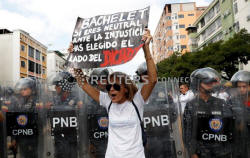|
Vice foreign minister William Castillo also rejected censure by
United Nations human rights chief Michelle Bachelet and denied
there was a humanitarian crisis in the leftist-led OPEC member
state whose economy has imploded.
President Nicolas Maduro's government says Venezuela is the
victim of a U.S. plot to topple him, eradicate socialism and
hand the world's largest oil reserves to multinationals.
But President Donald Trump's government calls him an
illegitimate dictator and has recognized opposition leader Juan
Guaido as interim ruler, slapping layers of sanctions on the oil
sector and Maduro allies.
"Today the United States has confiscated some $30 billion in
(state oil company) PDVSA assets while 40 banks are holding onto
some $5.4 billion, preventing Venezuela from purchasing food and
medication," Castillo told the U.N. Human Rights Council in
Geneva.
"Venezuela can't refinance its debt and oil tankers and
businesses are being punished," he added, saying oil export
income had plummeted from $40 billion per year to $5 billion.
The South American country has debts worth around $200 billion
to a diverse group of bondholders, commercial suppliers and
companies whose assets were expropriated.
With defaults mounting, creditors are reluctant to negotiate a
restructuring due to the U.S. sanctions.
Bachelet's report, which followed her visit to Caracas in June,
said Venezuelan security forces were sending death squads to
murder young men.
Castillo said Venezuela rejects such "criminal accusations".
"Beyond the certain occasional excess, it would seem that the
state is expected to sit still while serious security risks and
a coup d'etat are being planned including foreign intervention
as President Trump has threatened," he said.
Venezuela's crisis has seen waves of protests that have often
turned deadly in recent years. Four million Venezuelans have
fled their homeland, all but 700,000 of them since the end of
2015, U.N. aid agencies say.
Feliciano Reyna, head of a coalition of activist groups, told
the council democracy was disintegrating in Venezuela.
"The dismantling of the state and the breakdown of the state
give rise to widespread human suffering, social violence and
state policies that have closed down freedom of expression,
association, peaceful assembly, and give rise to repression,
arbitrary detention, torture and extrajudicial killings."
(Reporting by Stephanie Nebehay; Editing by Andrew Cawthorne)
[© 2019 Thomson Reuters. All rights
reserved.] Copyright 2019 Reuters. All rights reserved. This material may not be published,
broadcast, rewritten or redistributed.
Thompson Reuters is solely responsible for this content.

|
|





